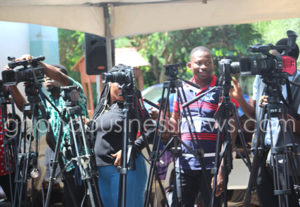World Press Freedom Day: The only security is in a free press
 World Press Freedom Day is celebrated on May 3 each year. The event was born in the UN General Assembly in December 1993, after the recommendation of UNESCO’s General Conference.
World Press Freedom Day is celebrated on May 3 each year. The event was born in the UN General Assembly in December 1993, after the recommendation of UNESCO’s General Conference.
Since then, May 3, the anniversary of the Declaration of Windhoek, is celebrated worldwide as World Press Freedom Day and the theme for this year’s celebration is: “Journalism without Fear or Favour.”
From May 4 to 6, UNESCO held several events including: a high-level dialogue on press freedom and tackling disinformation in the Covid-19 context, webinars, and online discussions via Facebook Live, YouTube, and Microsoft teams, amongst other digital platforms.
The sub-themes for this year press Freedom Day are: Safety of Women and Men Journalists and Media Workers, Independent and Professional Journalism free from Political and Commercial Influence, and gender equality in all aspects of the media.
Ghana has lost its status as Africa’s best-ranked country in the World Press Freedom Index to Namibia who topped the African league at 23 with Norway ranking first worldwide while Turkmenistan sat at the bottom at 180.
In the 2019 World Press Freedom Index report prepared by Reporters Without Borders, Ghana ranked 27 as against 23 in 2018. Ghana’s worst performance was in 2013 when it ranked 30 and its best was in 2015 ranking of 22. In 2014 Ghana placed 27 and made it to the 26 spot in 2016.
The report attributed the drop in four places mainly to the killing of a Tiger Eye PI member Ahmed Hussein-Suale; and journalists are rarely arrested but several were attacked with impunity in 2018, in some cases by law enforcement officers.
Although Ghana continues to be seen as one of the most democratic countries in Africa and Chapter 12 of its 1992 Constitution guarantees media pluralism and independence, a third of the media are owned by the state or by businessmen linked to the government.
Though the security situation for the country’s media might have improved, there have been constant press freedom violations, including police violence against journalists, ambush by political activists and reprisals instigated by criminal groups or corrupt local officials.
Thomas Jefferson once said, “The only security of all is in a free press.” The quote holds relevance in today’s time, as the world grapples with increasing threats to the free voice of journalism and perhaps the voice of reason itself.
At this time of the COVID -19 pandemic, the relevance of the freedom of the press has become more apparent amidst the fake news and false information being peddled through various social media platforms. Thus, the role of an unbiased press, free of fear or favour to any motives but the truth, is needed.
Adding his voice to this year’s celebration, Mr Kwame Malcom, Western Regional Vice Chairman of the Ghana Journalists Association (GJA), said freedom of the press can be achieved by ensuring that ownership of media houses are insulated from politicians.
He said media houses are often cash strapped making it possible for advertisers and multinational or big companies to control them with some advertisements which could be detrimental to the populace.
Mr Malcom said media houses must be self-sufficient but the economy is pretty fragile and as a result, the multiplicity of media houses is making the industry become easily compliant to make ends meet.
Mr Paa Kojo Peters of Connect fm, a subsidiary of Media General in Takoradi, said the hostility expressed towards journalists by political leaders in many countries has incited frequent acts of violence that have fueled an unprecedented level of fear and danger for journalists.
He said halting this cycle of fear and intimidation is a matter of the utmost urgency for all people of goodwill who value the freedoms acquired in the course of history.
Mr Peters said as the world witnesses more threats towards journalism, upholding the profession becomes even more important and that Ghana’s drop in the latest ranking of the World Press Freedom Index must serve as a wake-up call to increase the protection of journalists in the country.
Journalists must be adequately protected, he said, adding that those who perpetrate violence against them must be swiftly dealt with and called on successive governments to protect the media workers- journalists and media workers, to help them make informed decisions that could make the difference in building the economy.
He said the security agencies and other state actors must work to protect journalists as they discharge their duties and cases of attacks against journalists must also be investigated expeditiously and the perpetrators dealt with drastically.
By Seth Danquah
Source: GNA
